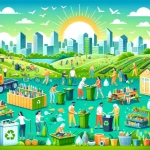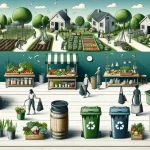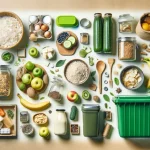
Hey eco-friends! Ready to make a positive impact on our planet? It’s time to embrace reusable products to replace disposables in our daily lives.
Let’s dive into the world of reusables and say goodbye to single-use items for good!
Reusable Products to Replace Disposables
Key Takeaways
- Reusable Products to Replace Disposables offer an eco-friendly alternative to single-use items.
- Opting for reusable bags, water bottles, and straws reduces waste and pollution.
- These sustainable choices save resources, decrease plastic use, and contribute to a cleaner environment.
- Embrace reusables for a greener lifestyle and a healthier planet.
Reusable Products to Replace Disposables
There are many reusable options you can use instead of disposables, and making the switch can save you money, reduce waste, and benefit the environment.
Here are some examples and tips on how to replace disposable items with reusable ones:
- Cleaning Supplies: Replace disposable cleaning wipes with DIY reusable wipes made from castile soap, essential oils, and water. Use old clothing or sheets as cleaning rags and make your own laundry stain remover and wood polish to avoid single-use plastic bottles.
- Food Items: Swap disposable bowl covers for reusable ones, and replace single-use plastic baggies with sewn and reusable snack bags. Use waxed fabric for food storage and replace paper napkins with cloth ones.
- Personal Items: Instead of disposable makeup remover squares, make your own or purchase reusable ones. Replace one-use heat pads with microwavable rice heating bags, and consider using cloth diapers instead of disposable ones.
- Other Reusables: Replace Ziploc bags with reusable snack bags, plastic wrap with beeswax food wrap, plastic straws with reusable ones, and disposable napkins with microfiber towels. Opt for reusable water bottles instead of buying bottled water, and switch to reusable filters for coffee.
Reusable products are better than disposable ones for several reasons:
- Environmental Impact: Reusables reduce the amount of waste that ends up in landfills and oceans.
- Cost-Efficiency: Although there might be an upfront cost, reusable products save money in the long run as they reduce the need for frequent replacements.
- Health Benefits: Many reusable products are made from safer, non-toxic materials.
- Quality: Reusables often offer better performance and durability compared to their disposable counterparts.
By making these swaps, you can contribute to a more sustainable lifestyle and help reduce the environmental impact of disposable products.
1. Introduction: Reusable Products to Replace Disposables
Hey there, eco-warriors! Are you ready to ditch the disposables and embrace a greener lifestyle?
We’re diving into the world of reusable products that’ll not only save you money but also give our planet a much-needed hug.
From swapping plastic straws for sassy stainless steel ones to trading paper towels for chic cloth napkins, we’re here to guide you through the simple swaps that make a big impact.
So, buckle up and get ready to revolutionize your routine with reusable wonders!
The Problem with Single-Use Plastics:
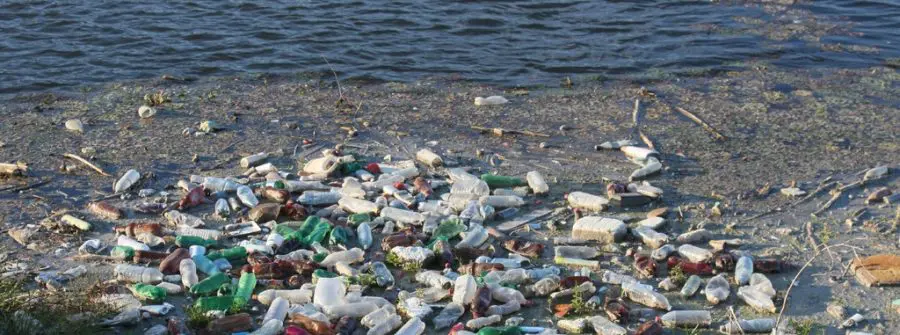
Single-use plastics and disposable items have become a pressing environmental concern.
Every year, millions of tons of plastic waste end up in our oceans, harming marine life and ecosystems.
From plastic bags fluttering in the wind to disposable coffee cups littering our streets, the evidence of our throwaway culture is everywhere.
It’s clear that our reliance on single-use items is unsustainable, and it’s time for a change.
Embracing Reusable Products:
The good news is that there’s a simple yet effective solution: switching to reusable products.
By choosing items that can be used again and again, we can drastically reduce our environmental footprint.
Reusable products not only help conserve resources and reduce waste but also promote a more sustainable way of living.
From reusable grocery bags to eco-friendly water bottles, there are countless options available to help you make the switch.
2. Swapping Disposable Items for Reusable Alternatives:
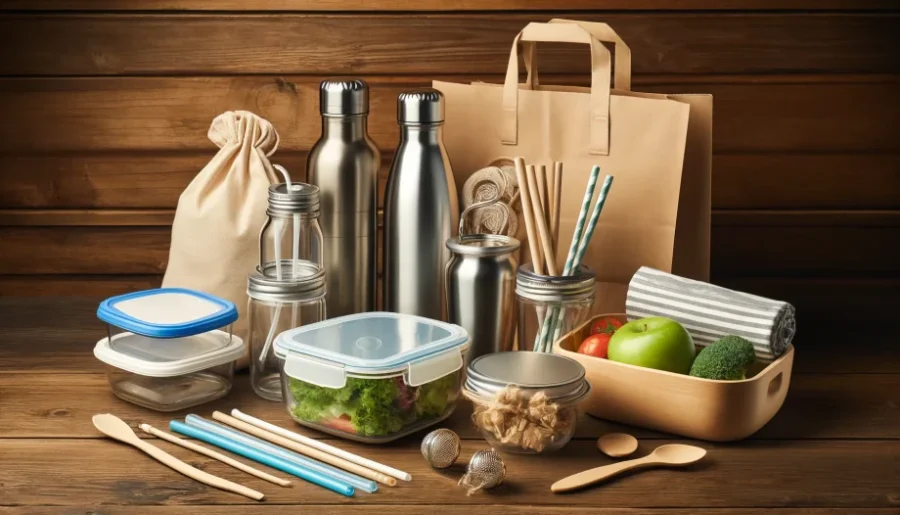
Tired of tossing out plastic after a single use? It’s time to make the switch to reusable alternatives!
Ditching disposable items for their reusable counterparts not only benefits the environment but also your wallet.
Let’s explore the advantages of using reusable bags, water bottles, and straws, and why making this swap is a win-win for you and the planet.
Reusable Bags vs. Disposable Bags:
- Environmental Impact: Swapping plastic bags for reusable ones can significantly reduce plastic waste, which often ends up in landfills or oceans, harming marine life.
- Cost Savings: Investing in a few sturdy reusable bags can save you money in the long run, as you won’t need to purchase disposable bags every time you shop.
- Convenience and Style: Reusable bags come in various designs and materials, making them a stylish and convenient choice for all your shopping needs.
Reusable Water Bottles vs. Disposable Bottles:
- Health and Safety: Many disposable plastic bottles contain harmful chemicals like BPA, while reusable bottles are often made from safer materials.
- Cost-Effectiveness: Buying a reusable water bottle is more cost-effective than constantly purchasing bottled water.
- Reduction in Plastic Waste: By using a reusable bottle, you can significantly reduce the number of plastic bottles that end up in landfills and oceans.
Reusable Straws vs. Disposable Straws:
- Environmental Benefits: Plastic straws are a major contributor to ocean pollution. Reusable straws, made from materials like stainless steel or silicone, help reduce this impact.
- Durability and Safety: Reusable straws are more durable than their plastic counterparts and don’t pose a risk to wildlife.
- Easy to Clean: Many reusable straws come with cleaning brushes, making them easy to clean and maintain for long-term use.
Table 1: Comparison of Disposable vs. Reusable Products
| Product Type | Disposable Option | Reusable Alternative |
|---|---|---|
| Shopping Bags | Plastic bags | Cloth shopping bags |
| Water Bottles | Plastic bottles | Stainless steel or glass bottles |
| Straws | Plastic straws | Stainless steel or silicone straws |
| Coffee Cups | Disposable cups | Reusable coffee mugs |
By embracing reusable alternatives, you can play a vital role in reducing environmental waste and promoting a more sustainable lifestyle.
So why not make the switch today and start enjoying the benefits of a greener, cleaner planet?
3. Reducing Kitchen Waste:

The kitchen is often the heart of the home, but it can also be a major source of waste.
From disposable paper towels to plastic wrap, everyday items contribute to our environmental footprint.
Fear not, eco-conscious cooks! We’ve got some simple swaps that will green up your kitchen routine and reduce waste without sacrificing convenience or cleanliness.
Cloth Napkins vs. Paper Towels:
- Environmental Impact: Cloth napkins are a sustainable alternative to paper towels, reducing deforestation and waste in landfills.
- Cost Savings: Investing in a set of cloth napkins can save you money in the long run, as they can be washed and reused for years.
- Versatility: Cloth napkins aren’t just for dining; they can also be used for cleaning spills and drying hands, making them a multi-purpose kitchen staple.
Beeswax Food Wrap vs. Plastic Wrap:
- Eco-Friendly: Beeswax wraps are made from natural materials and are biodegradable, unlike plastic wrap which can take hundreds of years to decompose.
- Reusable: With proper care, beeswax wraps can last for up to a year, reducing the need for disposable plastic wrap.
- Food Preservation: Beeswax wraps are breathable, which helps keep food fresh for longer, reducing food waste.
Reusable Containers and Shopping Bags:
- Storage Solutions: Ditch disposable containers and opt for reusable ones made from glass or stainless steel, which are safer and more durable.
- Shopping Smart: Bring your own reusable shopping bags to the grocery store to cut down on plastic bag use. You can also use reusable produce bags for fruits and vegetables.
- Meal Prep: Using reusable containers for meal prep not only reduces waste but also helps you save time and money by planning meals in advance.
Table 2: Kitchen Waste Reduction with Reusable Products
| Kitchen Item | Disposable Option | Reusable Alternative |
|---|---|---|
| Food Wrap | Plastic wrap | Beeswax food wrap |
| Food Storage | Plastic containers | Glass or stainless steel containers |
| Napkins | Paper napkins | Cloth napkins |
By making these simple swaps in your kitchen, you can significantly reduce your environmental impact and contribute to a more sustainable future. So why not start today and make your kitchen a greener, cleaner space for cooking and dining?
4. Eco-Friendly Personal Care:
It’s time to pamper yourself and the planet! Eco-friendly personal care is all about choosing reusable items over disposable ones.
From cloth diapers that cuddle your baby’s bum to menstrual cups that are kind to your body and the Earth, we’re exploring the advantages of sustainable personal care products.
Let’s dive into how these eco-friendly choices can make a big difference in your daily routine and the environment.
Cloth Diapers vs. Disposable Diapers:
- Environmental Impact: Disposable diapers contribute to landfills and ocean pollution. Cloth diapers, on the other hand, are reusable and reduce waste.
- Cost Savings: While there’s an upfront cost for cloth diapers, they can save you at least $1,000 per year, per child, compared to disposable ones.
- Comfort and Health: Cloth diapers are gentle on your baby’s skin and free from harmful chemicals found in some disposables.
Menstrual Cups vs. Disposable Products:
- Environmental Benefits: Menstrual cups have a much lower environmental impact than single-use pads and tampons, with reusable cups having less than 1% of the impacts of single-use options over a year of use.
- Cost-Effective: A menstrual cup can last up to 10 years, saving you money in the long run compared to the recurring cost of disposables.
- Health and Comfort: Menstrual cups are made from medical-grade silicone, offering a safe and comfortable alternative without the risk of toxic shock syndrome associated with tampons.
Reusable Safety Razors and Cotton Rounds:
- Sustainable Shaving: Reusable safety razors provide a close shave while reducing plastic waste from disposable razors.
- Eco-Friendly Makeup Removal: Swap disposable makeup wipes for reusable cotton rounds, which are gentle on the skin and can be washed and reused.
Table 3: Reusable Personal Care Products
| Personal Care Item | Disposable Option | Reusable Alternative |
|---|---|---|
| Diapers | Disposable diapers | Cloth diapers |
| Menstrual Products | Tampons, pads | Menstrual cups, cloth pads |
| Razors | Disposable razors | Safety razors |
Embracing reusable personal care products is not only a great way to reduce your environmental impact but also a smart choice for your health and wallet.
So why not make the switch and enjoy the benefits of a more sustainable and eco-friendly routine?
5. Sustainable Laundry Solutions:
Laundry day doesn’t have to be a burden on our planet. With sustainable laundry solutions, we can keep our clothes fresh and clean while also protecting the environment.
From eco-friendly detergents to reusable dryer balls, there are plenty of ways to green up your laundry routine.
Let’s dive into how you can make your laundry practices more sustainable and kinder to our Earth.
Replacing Dryer Sheets with Reusable Wool Dryer Balls:
- Eco-Friendly: Wool dryer balls are a sustainable alternative to single-use dryer sheets. They’re made from natural fibers and are biodegradable, reducing waste and pollution.
- Energy Efficiency: By improving air circulation in the dryer, wool dryer balls can reduce drying times and energy consumption, saving you money and reducing your carbon footprint.
- Cost-Effective: While there’s an upfront cost, wool dryer balls can last for up to 1,000 loads, making them a cost-effective choice in the long run.
Eco-Friendly Laundry Detergents:
Earth Breeze Laundry Detergent Sheets
- Non-Toxic: Opt for laundry detergents that are free from harmful chemicals and fragrances. Earth Breeze offers non-toxic laundry detergent sheets that are eco-friendly and gentle on clothes.
- Plastic-Free Packaging: Choose brands that use minimal or zero plastic packaging to reduce plastic waste. Earth Breeze, for example, doesn’t use plastic for its products, packaging, or shipping.
- Giving Back: Some eco-friendly detergent brands, like Earth Breeze, also give back to the community by donating laundry loads to shelters for every detergent pack purchased.
The Impact of Traditional Fabric Softeners:
- Harmful Chemicals: Traditional fabric softeners often contain synthetic chemicals that can be harmful to the environment and your health.
- Water Pollution: The chemicals in fabric softeners can contaminate waterways, harming aquatic life and ecosystems.
- Natural Alternatives: Consider using natural alternatives like vinegar or baking soda in your wash cycle to soften clothes without the negative environmental impact.
Table 4: Sustainable Laundry Alternatives
| Laundry Item | Disposable Option | Reusable Alternative |
|---|---|---|
| Dryer Sheets | Single-use sheets | Wool dryer balls |
| Fabric Softener | Liquid softener | Vinegar or baking soda |
By adopting these sustainable laundry solutions, you can reduce your environmental impact, save money, and enjoy the benefits of fresh, clean clothes without the guilt.
Every small change counts towards a greener future!
6. On-the-Go Reusables:
In our fast-paced lives, convenience often comes at the cost of our environment. But it doesn’t have to be that way!
With on-the-go reusables, we can enjoy the convenience of our favorite drinks and snacks without contributing to the mountains of waste from disposable products.
From sipping coffee in a stylish reusable mug to hydrating with a chic water bottle, let’s explore how easy and beneficial it can be to make sustainable choices on the go.
Reusable Coffee Mugs and Water Bottles:
Simple Modern Travel Coffee Mug Tumbler with Flip Lid
- Reduce Waste: Billions of disposable coffee cups and plastic water bottles are thrown away each year, polluting our planet. By using a reusable coffee mug or water bottle, you can significantly cut down on this waste.
- Save Money: Many coffee shops offer discounts to customers who bring their own mugs. Similarly, refilling a reusable water bottle is much cheaper than constantly buying bottled water.
- Keep Drinks at the Perfect Temperature: Many reusable mugs and bottles are designed to keep your drinks hot or cold for hours, making them a practical choice for your daily commute or outdoor adventures.
Carrying Reusable Utensils and Produce Bags:
- Convenience Without the Guilt: Reusable utensils are lightweight and easy to carry, so you can say no to single-use plastic cutlery when eating out or on the go.
- Healthier and Safer: Reusable utensils are often made from safer materials like stainless steel or bamboo, which don’t leach chemicals into your food like some plastics can.
- Eco-Friendly Shopping: Bringing your own reusable produce bags to the grocery store or farmers’ market reduces the need for plastic bags and helps you avoid unnecessary packaging.
By incorporating these on-the-go reusables into your daily routine, you can make a positive impact on the environment while enjoying the convenience and style they bring to your life.
Let’s embrace these sustainable swaps and lead the way to a cleaner, greener future!
7. Making Small Changes with Big Impact:
Sometimes, the smallest changes can have the biggest impact. Little shifts in our daily habits can add up to significant environmental benefits.
From powering our gadgets with rechargeable batteries to sipping our favorite brews from our own cups at coffee shops, let’s explore how these minor adjustments can lead to major positive changes for our planet.
Using Rechargeable Batteries:
- Waste Reduction: Switching to rechargeable batteries helps reduce the amount of hazardous waste in landfills, as disposable batteries contain toxic materials that can harm the environment.
- Cost Savings: While rechargeable batteries have a higher initial cost, they can be recharged hundreds of times, making them more cost-effective in the long run.
- Energy Efficiency: High-quality rechargeable batteries, such as Sanyo Eneloops, are known for their longevity and consistent charge levels, further enhancing their sustainability credentials.
Bringing Your Own Cup to Coffee Shops:
- Reducing Single-Use Packaging: By bringing your own reusable coffee cup, you can help cut down on the billions of disposable cups that end up in landfills and contribute to pollution each year.
- Financial Incentives: Many coffee shops, including Starbucks and Blue Bottle, offer discounts to customers who bring their own cups, making it a win-win for your wallet and the environment.
- Consumer Influence: The growing trend of using reusable cups can inspire others to adopt more sustainable habits, leading to a collective reduction in waste and pollution.
The Importance of Conscious Consumer Choices:
- Plastic Reduction: Every time we choose a reusable option over a disposable one, we’re taking a step towards reducing plastic use and preventing water pollution.
- Empowering Change: Our individual choices send a message to businesses and policymakers about the demand for more sustainable products and practices.
- Collective Impact: When many people make small changes, the cumulative effect can be significant, leading to a more sustainable and environmentally friendly society.
By adopting these small changes, we can all contribute to a greener planet and a more sustainable future.
So next time you’re about to grab a disposable battery or a single-use coffee cup, remember the big impact that small choices can make!
8. Overcoming Challenges and Embracing Reusables:
Switching to reusable products is a fantastic step towards a more sustainable lifestyle, but it’s not without its challenges.
From the initial investment to finding convenient alternatives, there are hurdles to overcome.
But don’t worry, we’ve got you covered! In this section, we’ll address common concerns and offer practical tips for seamlessly integrating reusables into your daily life.
Let’s tackle these challenges head-on and make the transition to reusables a breeze!
Starting Small and Gradual Transition:
- One Step at a Time: Don’t feel pressured to overhaul your entire lifestyle overnight. Start small by replacing disposable items with reusable alternatives as they run out. This gradual approach is easier on your wallet and less overwhelming.
- Quality Over Quantity: Invest in high-quality reusable items like stainless steel water bottles or durable food storage containers. They may cost more upfront, but they’ll save you money and reduce waste in the long run.
- Mindful Consumption: Remember, the goal is to consume less and use what you have. Before making a purchase, consider whether it’s a necessity and how it aligns with your sustainability goals.
Overcoming Time and Convenience Constraints:
- Plan Ahead: Take a few extra minutes to prepare for your day. Pack a reusable water bottle, coffee cup, and utensils for on-the-go convenience.
- Create a Sustainable Kit: Keep a set of reusable items in your car, bag, or at your workplace. This way, you’re always prepared to make eco-friendly choices.
- Build a Support System: Connect with friends, family, or online communities who share your commitment to sustainability. They can offer support, share tips, and keep you motivated.
Building Emotional and Mental Resilience:
- Set Realistic Goals: Be kind to yourself and set achievable targets. It’s okay not to be perfect; what matters is progress.
- Celebrate Small Victories: Acknowledge and celebrate each step you take towards a more sustainable lifestyle. These positive reinforcements will keep you motivated.
- Seek Support: Don’t hesitate to reach out to others on a similar journey. Sharing experiences and challenges can provide valuable insights and encouragement.
Educating Yourself and Advocating for Change:
- Stay Informed: Educate yourself about sustainability, waste reduction, and the impact of your choices. Knowledge is power, and it can guide you to make informed decisions.
- Advocate for Sustainable Options: Encourage local stores and businesses to offer more sustainable, zero-waste options. Your voice can drive change in your community.
- Embrace a Community Approach: Collaborate with others to share resources, knowledge, and support. Together, you can amplify your impact and make sustainable living more accessible.
By embracing these strategies and making small, conscious changes, you can overcome the challenges of transitioning to reusables and enjoy the benefits of a more sustainable lifestyle.
Remember, every step counts, and your efforts contribute to a healthier planet for future generations!
FAQ Section: Navigating the World of Reusables
Are you curious about making the switch to reusable products? We’ve got answers to some common questions to help you get started on your journey to a more sustainable lifestyle.
Q. Are reusable products as effective as disposable ones?
A. Absolutely! Reusable products like cloth napkins, water bottles, and shopping bags are designed to be just as effective, if not more so, than their disposable counterparts. Plus, they often come with added benefits like durability and better materials.
Q. How do I care for my reusable products to ensure they last?
A. Proper care is key to extending the lifespan of your reusables. For example, washing reusable bags and bottles regularly, storing them properly, and following the manufacturer’s care instructions will keep them in tip-top shape for years to come.
Q. Where can I find reusable products?
A. Reusable products are becoming increasingly available! You can find them in many grocery stores, online retailers, and specialty eco-friendly shops. Keep an eye out for sustainable brands that prioritize quality and environmental responsibility.
Q. Are reusable products more expensive than disposables?
A. While reusable products may have a higher upfront cost, they save you money in the long run since you won’t need to repurchase them as frequently as disposable items. Plus, many reusable options offer discounts and incentives, making them an economically smart choice.
Q. Can switching to reusable products really make a difference?
A. Absolutely! Every reusable item you use reduces the amount of waste that ends up in landfills and oceans. When multiplied by the number of people making the switch, the impact is significant. Your choices contribute to a cleaner, greener planet.
If you have more questions or need further information, don’t hesitate to reach out to organizations and resources dedicated to sustainable living.
Together, we can make a positive impact on our environment, one reusable product at a time!
Conclusion: Embracing a Reusable Future
Summarizing the Journey to Sustainability:
We’ve explored the vast world of reusables, uncovering how small changes in our daily habits can lead to significant environmental benefits.
From opting for cloth diapers to carrying reusable water bottles, each choice we make towards sustainability reduces our reliance on disposable items, lessens our environmental footprint, and promotes a healthier planet.
The Impact of Reusable Choices:
Choosing reusable products is not just an eco-friendly decision; it’s a statement of commitment to a more sustainable future.
By embracing reusables, we conserve natural resources, save money in the long run, and contribute to a cleaner, greener world.
Every reusable item we use is a step away from unnecessary waste and a step closer to a more sustainable lifestyle.
A Call to Action for a Greener Tomorrow:
We encourage you to join the reusable revolution and make conscious choices that support a sustainable future.
Share your experiences, inspire others, and together, let’s create a ripple effect of positive change.
Your actions, no matter how small, play a crucial role in shaping a better world for generations to come.
Let’s embrace the power of reusables and pave the way for a cleaner, greener planet.
Read more: Mastering Zero-Waste Living: 7 Easy Tips and Tricks
Resources for Sustainable Living:
Websites and Organizations:
- U.S. Environmental Protection Agency (EPA) – Reduce, Reuse, Recycle: Learn about reducing waste, reusing items, and recycling materials to protect the environment. EPA – Reduce, Reuse, Recycle
- United Nations Environment Programme (UNEP) – Beat Plastic Pollution: Explore the UNEP’s efforts to combat plastic pollution and find resources for sustainable living. UNEP – Beat Plastic Pollution
Books:
- “Zero Waste Home” by Bea Johnson: A guide to simplifying your life by reducing waste, with practical tips for a more sustainable household. Get it on Amazon
- “Cradle to Cradle: Remaking the Way We Make Things” by William McDonough and Michael Braungart: A groundbreaking book that presents a new approach to product design and sustainability. See it on Amazon
Documentaries:
- “A Plastic Ocean”: An eye-opening documentary that explores the devastating impact of plastic pollution on the oceans and marine life. A Plastic Ocean – The Movie
- “The True Cost”: A film that exposes the environmental and social impacts of the fashion industry, including the issue of disposable clothing. The True Cost – Wikipedia
Social Media Accounts:
- Zero Waste Home (@zerowastehome): Bea Johnson shares tips and inspiration for living a zero-waste lifestyle. Home – Zero Waste Home
- Trash is for Tossers (@trashisfortossers): Lauren Singer documents her journey towards a zero-waste life and offers practical advice for reducing waste. Trash is for Tossers | Zero Waste Living is Simple, Cost Effective, and Fun
- Plastic Pollution Coalition (@plasticpollutes): An organization that raises awareness about plastic pollution and promotes solutions for a plastic-free world. Home | Plastic Pollution Coalition
These resources can provide valuable insights and inspiration for replacing single-use plastics and embracing a more sustainable lifestyle.





